Last year, as winter was setting in, my niece Julie accosted me, looking for some needlework to do that wasn’t difficult, that worked up easily and quickly, and that would give her something creative to do with her hands during the evening hours.
We foraged about in my Bin of Sundry Collected Needlework Goods, and came across a couple Huck weaving (also called Swedish weaving, among other names) towel kits. So I passed them off to her – and guess what came back to me last weekend? A finished towel!
Huck weaving also came up in our Needle ‘n Thread group over on Facebook not too long ago, too, so I thought I’d touch on the topic here, mention some resources, and direct you to the free pattern that you’ll see on Julie’s towel.
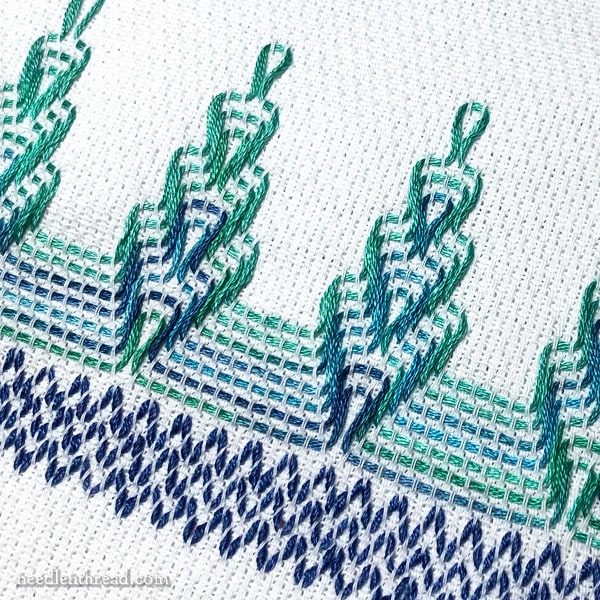
Huck weaving – which is also known as Huck embroidery, Huckaback darning, Swedish weaving, and other names depending on which country you hail from – is a fairly simple surface darning technique that produces geometric and linear designs on a particular type of fabric, called huck fabric.
Although different forms of huck weaving (and decorative darning) stretch back pretty far into textile history, the huck weaving we know today was mostly popular in the US during the 1930’s-40’s. It was inexpensive way to decorate toweling, after all.
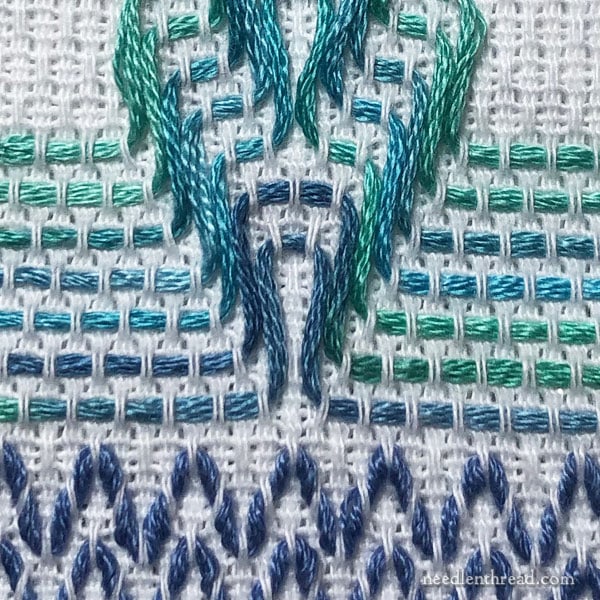
Huck fabric is a cotton toweling fabric that features “floats” in the weave – or threads that cross in front of other threads in the fabric without locking into those other threads. In this manner, the threads crossing in front “float” above the threads behind.
The floats provide a nice little pattern in the weave and they make it very easy to pass a decorative thread under the floats to adorn the fabric.
Today, huck fabric is still pretty common stuff, and it’s normally fairly inexpensive. It’s absorbent and very low lint, making it excellent for toweling, so in various industries, you’ll actually find inexpensive towels made of huck fabric.
Huck toweling used to come about 14″ wide, but these days, it’s more common to find 15″ or 17″ wide huck toweling. You can also purchase huck fabric in widths up to 60″.
Both sides of the fabric look pretty much the same, except that, on one side, there are two threads per float, and on the other there is only one thread per float. The side with the two-thread floats is considered the front of the fabric.
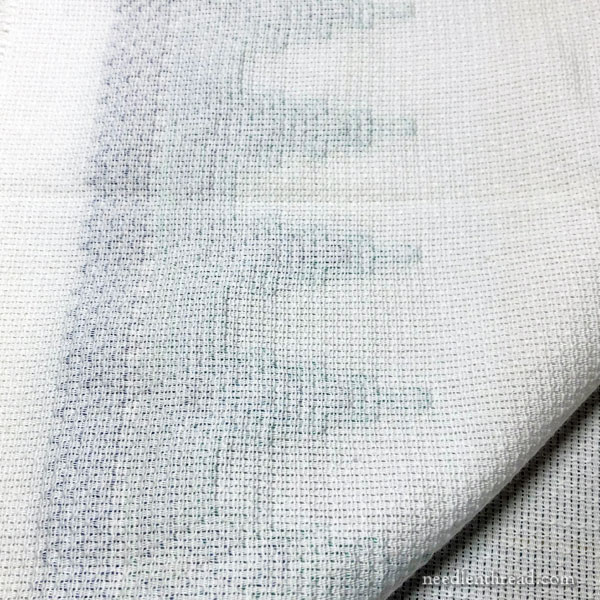
The really interesting thing about huck fabric is that the floats allow you to stitch without taking your needle to the back of the fabric, so that no thread shows on the back.
That’s kinda nice, isn’t it?
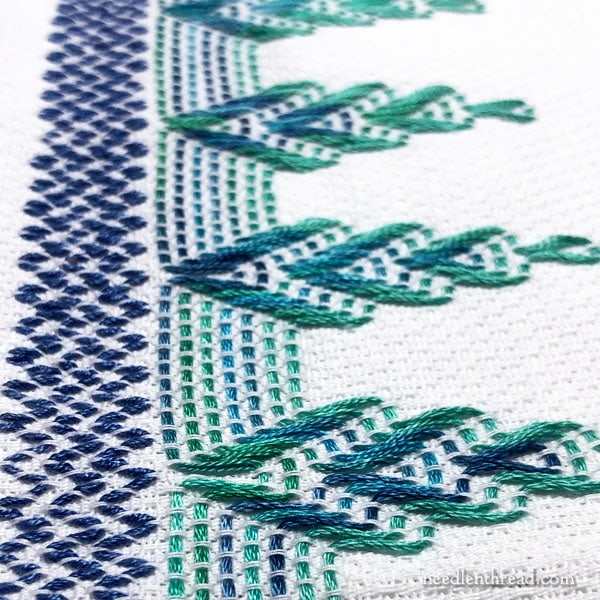
Huck weaving can be as simple or as complicated as you want to make it. It can be worked with perle cotton threads or with stranded cotton.
It can even be worked on other cloth, like monk’s cloth, but if you want the towel effect, huck toweling is the better choice. You can use monk’s cloth for larger scale afghans and the like.
Some folks use Aida cloth for huck weaving, because it also features floats, but Aida cloth is not as absorbent and it doesn’t make as pretty a towel. The structure of the weave is different, and the fabric tends to be much thinner.
Where to Find Swedish Weaving Supplies, Books, Kits, and Instructions
If you’re looking for huck toweling to practice decorative darning or Swedish weaving, there are several ways to come by it. It’s available through fabric stores like JoAnn’s, but I’ve heard that the quality isn’t all that great. I haven’t bought any myself, so I don’t know for sure.
Huck toweling is also available as already-made (and hemmed) towels through suppliers for textiles in industries like the medical industry, the restaurant industry, and so forth. Though I haven’t done it myself, I’ve heard that folks buy these already-made towels, take out the hemming, trim the towels up as necessary, and re-hem the sides, leaving the top and bottom edges self-fringed.
There are vendors for Swedish weaving designs and supplies on Etsy, too. Just search “Swedish Weaving.”
If you’re eager to try a relatively simple and inexpensive embroidery technique that can produce some pretty results, why not give huck weaving a try?
Thanks, Julie, for the pretty towel! You did a swell job!

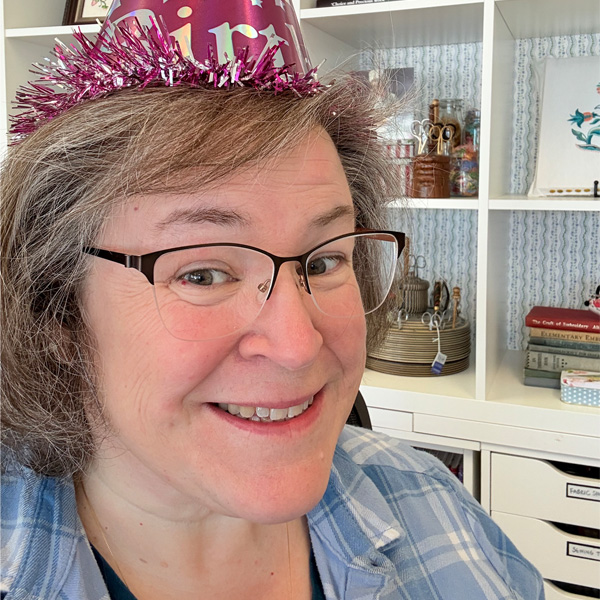
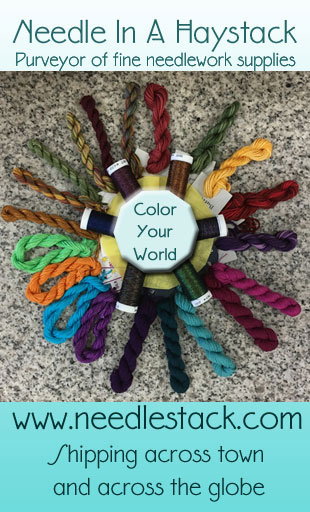
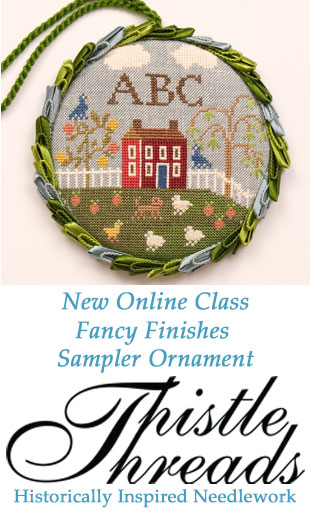

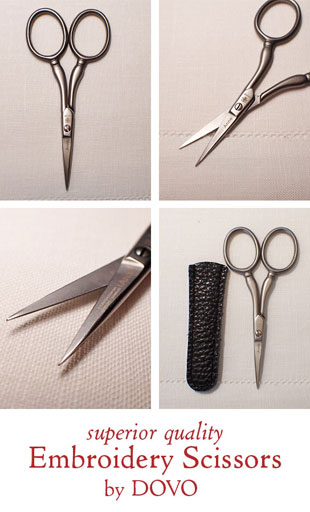
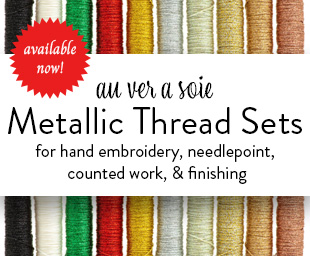
Beautiful work and great colors! Would love to see a penny or something laid on the towel for scale in one of those photos: I can’t quite wrap my head around how big or little the design is.
Also, if you don’t take the thread to the back then how do you end the thread?? (must be a simple obvious way…)
The Swedish weaving looks like fun. The towel is so pretty – I really like the color combination. Well done Julie!!
Dear Mary
A very pretty design and an interesting technique I’ve not heard of Huck weaving before but it looks a lovely way to decorate towelling and a cheap alternative to the more expensive linen. It looks like your Niece enjoyed the project and lovely that she finished it. I wouldn’t mind having a go at the Huck weaving technique, it would be interesting to learn. Thanks for sharing with us Huck weaving and for the photos and where to purchase the fabric. Happy Wednesday
Regards Anita Simmance
Hi Mary,
I was happy to see this post! I recently used this same pattern, only in reds and golds. I love the blue, very pretty! Your niece did a beautiful job. I found this style of embroidery to be so relaxing – and FAST!!
You can see the red version here:
Beautiful work. I have not heard of Huck weaving before and was wondering about the knotting, also.
Mary,
Thanks for this post! I made a kitchen towel with this design, 6 years ago. Plus 4 other designs which I gave as gifts. My towel and design have held up well through regular use and wash. It’s far outlasted other kitchen towels! Thanks to your post, I just ordered fabric from Nordic Needle. These are simple quick projects I actually finish!
that’s great to hear!
i’d love to weave this fabric and then decorate it.
and i was worried the embroidery would be too delicate for regular kitchen use and laundry!
Cicely,
When my grandmother was really old, my aunt let me have some of her linens in 1985. Among them I found a Swedish weaving huck towel that I had made when I was 13 (1958) and had given to my grandmother.
Then I took it home and used it for several more years, until I realized that it was a vintage fabric and put it away.
Wow, very nice! A blast from the past too! My grade 7 home economics teacher used huck weaving to introduce us to embroidery and sewing. We were free to create whatever pattern we could imagine and our finished cloths were turned into cushions. This kicked off my love of all things needle and thread 50 years ago! I think I’ll go get some huck cloth and give it a go again!
Thank you for the article – I love keeping older forms of needlework alive. I love swedish weaving though I am no expert. It is very relaxing and rewarding to produce something useful in the home.
With SW, and Monk’s cloth, people have made purses, totes, designs on purchased rugs, etc. – and ruanas and pillow covers (sometimes a pillow can be purchased with the type of fabric conducive for SW – as are blankets) and whatever your imagination can conjure up.
My friend has incorporated SW into her triloom weaving, as well. Amazing.
When I was practicing Tunisian Crochet, I accidentally made a piece that had the capacity for adding SW designs!
A cantor in CT makes tallit (singular) using SW designs … absolutely stunning!
Believe me, afghans and table runners and placemats are but three items that can be made!!
Don’t buy huck toweling from fabric.com.
Whatever it is that they’re selling, it’s not the huck toweling you describe, or that I used when I was a child.
I bought some and I’m going to have to send it back.
Swedish Weaving doesn’t always have to be designs like the ‘trees’ … you can also do pictures!
My dearest friend designed many SW for Monk’s cloth – and her designs are being sold. She then incorporated SW into her triloom weaving designs.
I will try to send you a photo of one of Sandra’s picture afghans. After showing her filet crochet, she was able to incorporate some of those designs, too.
SW can be done by very young children who have been taught the basic ‘how to handle a needle’ types of working with any tool.
Thank you, Mary, for showing SW. Most of the same designs from Monk’s cloth and worsted yarn can be done on Huck fabric and Aida cloth, using floss and/or perl cotton using a dull-pointed needle, rather than a bodkin.
You can check https://www.nettiesneedleworks.com/
Nettie is a wonderful person … and I can recommend her.
Aida or Huck fabric uses floss and/or perle cotton – but you can purchase Monk’s cloth from Nettie’s and that has a 7 stitch count so worsted yarn is used with a flat bodkin or a large yarn needle. Nettie will know.
Monk’s cloth does require zigzagging around the edge of the fabric – and pre-washing to shrink BEFORE doing any weaving.
My best friend’s designs are amazing: SandrasStitches. Not sure if Nettie has designs other than her own. I’m doing her Celtic Jewel.
I am going through dozens of boxes from my Mother’s home and my Aunt’s home and found an unstitched Huck Towel, “Wild Lilies” No. 529. Also printed on the towel, “Made in the U.S.A. by Wonder Art -F44.” Do you know when this towel was first manufacture? Thank you for your assistance.
Sincerely, lil
I just learned that the embroidered guest towels made more than 50 years ago by my grandmother have Swedish huck weaving. I have been searching online for a kit that I can purchase and try making similar towels. Your article is very helpful. Thank you!
Help! I am desperately looking for Huck Toweling to purchase! I live in Michigan & I have checked with two JoAnn’s but have been told by management that it has been discontinued by them. I LOVE doing Swedish Embroidery.
Please, can u help me?
Sincerely
Pauly
Hi, Pauly – There are different grades of Huck toweling these days. If you’re looking for good Huck toweling to use for really “heirloom quality” towels and such, then Thomas Ferguson in Ireland still weaves a beautiful linen huck fabric. I don’t know if they sell it by the meter or if they only sell pre-made towels from it. If you’re looking for cotton huck toweling, a google search should bring up sources. It’s pretty much the same stuff as surgical huck toweling. Once upon a time, there used to be different grades and sizes of the huck weave – I think some of the older towels that I’ve seen have a much finer weave than the toweling available today. There are also sources on sites like Etsy. But I don’t have one particular source to send you to. You’ll probably just need to search online and see what you can find. It wouldn’t hurt to search for “surgical huck toweling” to see if anything comes up.
I am trying to get back into doing the Swedish Embroidery on huck towels. I learned many years ago but would like to do it again. My problem is the shipping expenses are extremely high. Do you have a source that might be less expensive. One site I’ve looked at the shipping expenses are higher than the product itself.
Maybe check Lacis in California – http://www.lacis.com – they might have some supplies and patterns available.
Looking for swedish hulk material by thr yard.
I have ordered fabric and patterns from https://www.monksclothlady.com/.
I can not find the huck towel to do huck embroidery on. they say it is but when it came it is not the right cloth.
I used to love doing this as a child. I used to create my own patterns too. I would love to take this up again if I can find the supplies.
Where can I find the above pattern now that Nordic Needle is closed?
Hi, Carol – I’d check Etsy or eBay for books on Huck or Swedish weavings. Most of the old books have patterns very similar to this one, if not the same as this one.
Such a beautiful work! Love the colors! Is that the DMC 6 strand thread?,Can you please share the details of the color of the embroidery floss (name and number of the color)?
Is this pattern still available? I love the look of the variegated threads! I need some instruction to achieve this look though. Thanks!
There are similar patterns in the new book that just came out, that I wrote about here: https://www.needlenthread.com/2024/04/swedish-weaving-pattern-directory-review.html
You mentioned a free pattern for Julie’s tiwel. Where would one find the pattern.
Hi, Wendy – this was available once upon a time from Nordic Needle, but since then, that business has closed. Sorry about that!
Is this the Jewel, done on towels
I was wondering if you could tell me where to find Huck Towel fabric. I have things I made years ago that are on Red and Yellow toweling. Even the white is hard to find. Also, do you line the back of your projects?
Susie
Hi, Susie – there’s a shop online called “equilter” out of Colorado. They carry white huck. I don’t know if they carry colors or not.
With huck embroidery, no, the back is not lined.